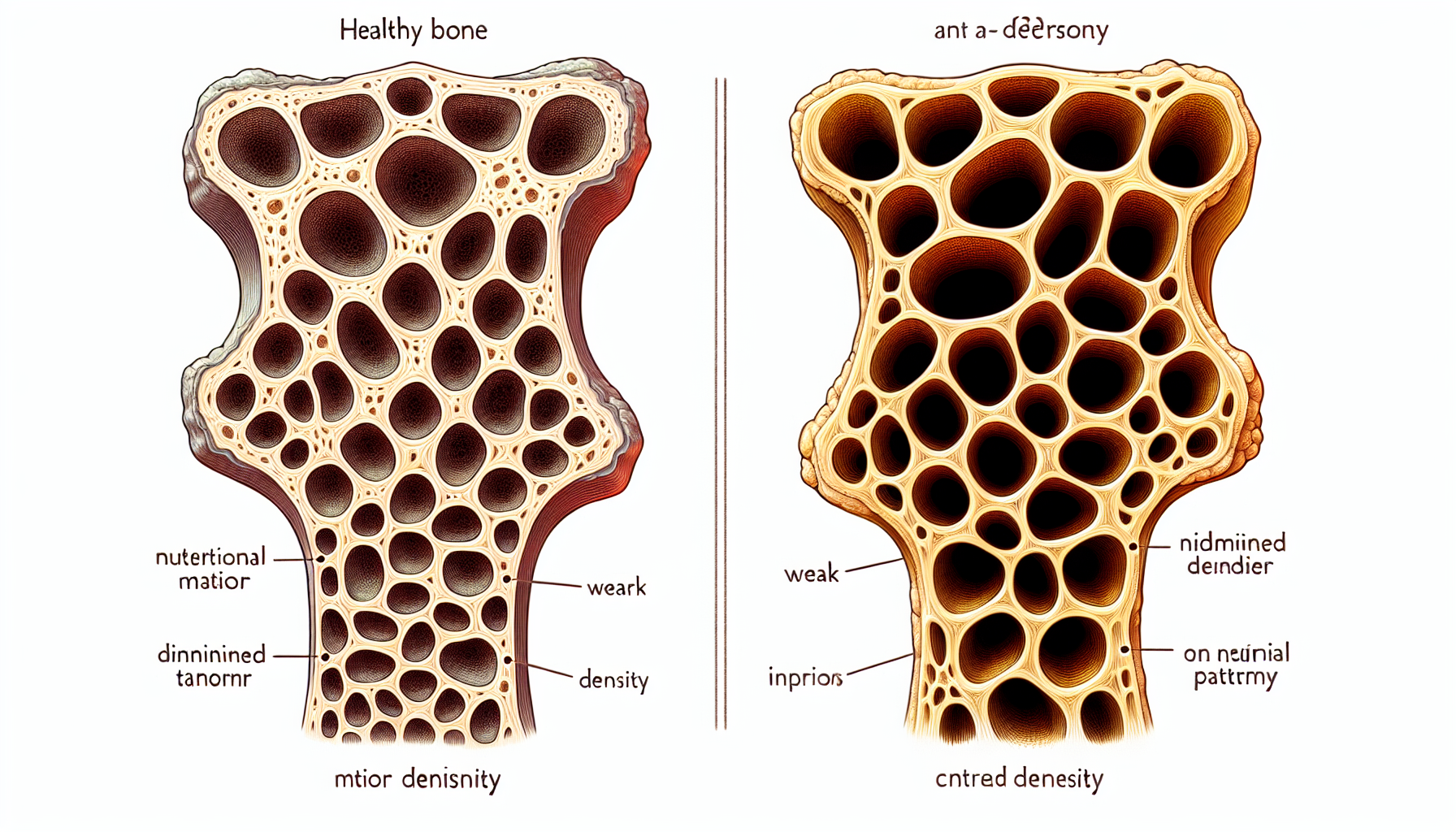Bone health is a critical component of overall well-being, yet it is often overshadowed by more immediate health concerns. However, the long-term impact of nutritional deficiencies on bone structure and strength can be profound, with implications for mobility, pain, and quality of life. This comprehensive exploration will delve into the mechanisms through which nutrition—or the lack thereof—can influence bone health and what steps can be taken to mitigate these effects.
The Building Blocks of Bone Health
Bones are living tissues that constantly remodel themselves. This dynamic process requires a wide range of nutrients, including but not limited to calcium and vitamin D. While the importance of these two nutrients is well-established, bones also need other vitamins and minerals to maintain their integrity and strength.
Calcium and Vitamin D: The Dynamic Duo
Calcium serves as the primary building block for bones, while vitamin D helps the body absorb calcium efficiently. Without sufficient vitamin D, calcium cannot do its job effectively. This interdependence underscores the need for a balanced intake of both nutrients.
The Role of Other Nutrients
Magnesium, phosphorus, vitamin K, and fluoride also play crucial roles in bone health. For instance, magnesium assists in the conversion of vitamin D to its active form, which is essential for calcium absorption. Phosphorus is another critical mineral found in bones, and an imbalance between calcium and phosphorus can lead to bone loss.
Trace Elements: Small but Mighty
Trace elements like zinc, copper, and manganese might be needed in smaller amounts, but their impact on bone health is significant. Zinc helps with bone formation and mineralization, copper is involved in the cross-linking of collagen and elastin, and manganese is crucial for the formation of bone cartilage and bone collagen.
For more detailed insights into maintaining optimal bone health, consider exploring Bone Health Maintenance with Age.
Nutritional Deficiencies and Their Impact on Bone Health
Nutritional deficiencies can lead to several bone-related conditions, such as osteoporosis, osteopenia, and rickets. These conditions are characterized by weakened bones that are more susceptible to fractures and deformities.
Osteoporosis: A Silent Threat
Osteoporosis is often called a silent disease because it can progress without symptoms until a fracture occurs. A diet lacking in calcium and vitamin D is a major risk factor for osteoporosis. The body will leach calcium from the bones to maintain normal cellular function, weakening them over time.
Rickets and Osteomalacia: The Role of Vitamin D
Rickets in children and osteomalacia in adults are both conditions that result from severe vitamin D deficiency. These diseases lead to softening and weakening of the bones, resulting in skeletal deformities in children and pain and fragility in adults.
For a deeper understanding of how hormonal changes can affect bone density, read about the Link Between Hormonal Changes and Bone Density.
Addressing Nutritional Deficiencies for Stronger Bones
Preventing and addressing nutritional deficiencies is key to maintaining strong bones. Here are some strategies:
Balanced Diet: The Foundation
A diet rich in fruits, vegetables, lean proteins, and whole grains can provide most of the nutrients necessary for bone health. Dairy products, fatty fish, and fortified foods are excellent sources of calcium and vitamin D.
Supplementation: Filling the Gaps
When dietary intake is not enough, supplements can help fill the gaps. It’s critical to choose high-quality supplements and to consult with a healthcare provider for appropriate dosages and combinations.
Lifestyle Choices: Exercise and Sunlight Exposure
Regular weight-bearing exercise stimulates bone formation. Additionally, modest sunlight exposure can boost vitamin D levels, though it’s important to balance this with skin cancer risk.
For insights into optimizing bone health through diet and exercise, consider the article on Combating the Risk of Osteoporosis.
Advanced Nutritional Interventions for Bone Health
Beyond the basics, there are more nuanced ways that nutrition affects bone health:
Potassium and Bone Density: Potassium may neutralize acid in the body that can leach calcium out of bones. Fruits and vegetables are excellent sources of potassium.
Protein’s Complex Role: While necessary for bone health, excessive protein intake, especially from animal sources, can increase calcium excretion. Balancing protein sources is key.
The Omega-3 Connection: Omega-3 fatty acids have been shown to support bone density, potentially due to their anti-inflammatory effects.
For a comprehensive look at the role of various nutrients in bone health, the article on Nutrients Beyond Calcium and Vitamin D is invaluable.
Cutting-Edge Research on Nutritional Deficiencies and Bone Health
Continuing research is shedding light on lesser-known aspects of bone health. Here are some niche resources supporting the points discussed:
- A study on the impact of potassium on bone health provides insights into this mineral’s potential benefits.
- Research into the role of omega-3 fatty acids in bone density offers a detailed look at how these nutrients contribute to bone strength.
- An exploration of the effects of protein on bone health elucidates the balance needed between protein intake and bone integrity.
Final Thoughts
Nutritional deficiencies have a profound impact on bone structure and strength, but they are also among the most preventable of health issues. By understanding the role of various nutrients in bone health, making smart dietary choices, staying active, and seeking professional guidance when needed, individuals can build and maintain strong bones throughout their lives.
Incorporating this knowledge into a holistic approach to health can lead to not only stronger bones but also improved overall health and a better quality of life.



